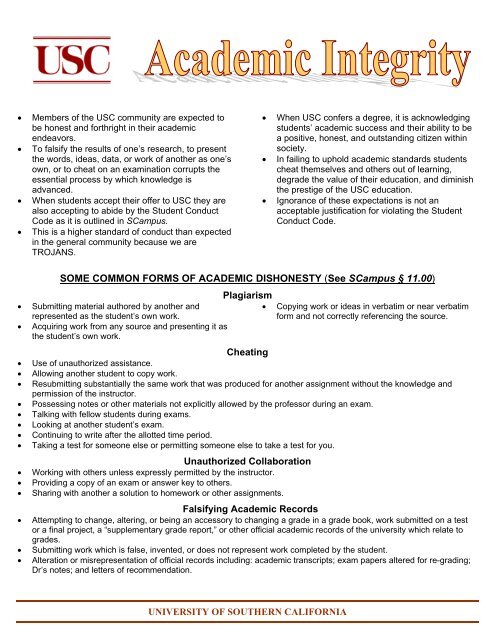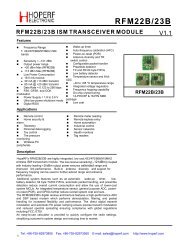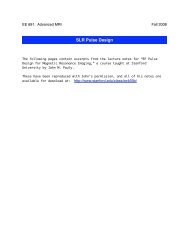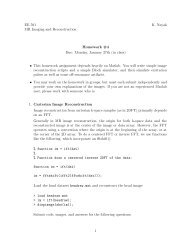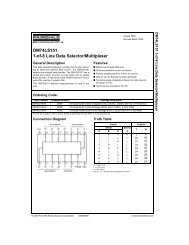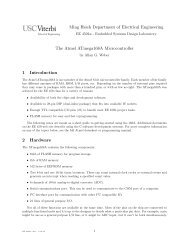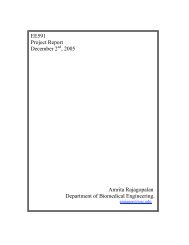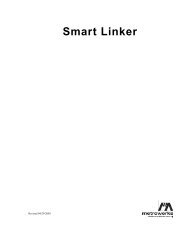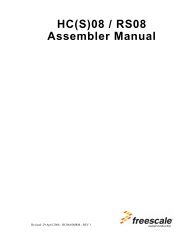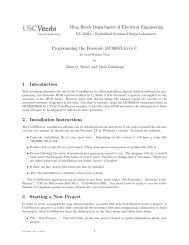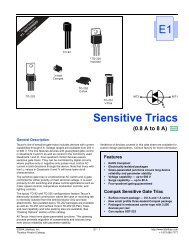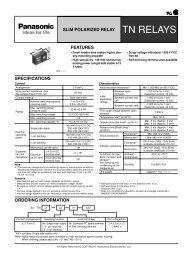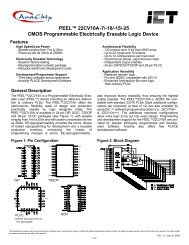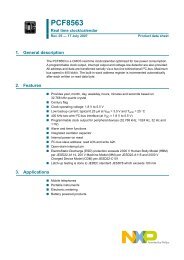academic integrity - Course Material - University of Southern California
academic integrity - Course Material - University of Southern California
academic integrity - Course Material - University of Southern California
You also want an ePaper? Increase the reach of your titles
YUMPU automatically turns print PDFs into web optimized ePapers that Google loves.
• Members <strong>of</strong> the USC community are expected to<br />
be honest and forthright in their <strong>academic</strong><br />
endeavors.<br />
• To falsify the results <strong>of</strong> one’s research, to present<br />
the words, ideas, data, or work <strong>of</strong> another as one’s<br />
own, or to cheat on an examination corrupts the<br />
essential process by which knowledge is<br />
advanced.<br />
• When students accept their <strong>of</strong>fer to USC they are<br />
also accepting to abide by the Student Conduct<br />
Code as it is outlined in SCampus.<br />
• This is a higher standard <strong>of</strong> conduct than expected<br />
in the general community because we are<br />
TROJANS.<br />
• When USC confers a degree, it is acknowledging<br />
students’ <strong>academic</strong> success and their ability to be<br />
a positive, honest, and outstanding citizen within<br />
society.<br />
• In failing to uphold <strong>academic</strong> standards students<br />
cheat themselves and others out <strong>of</strong> learning,<br />
degrade the value <strong>of</strong> their education, and diminish<br />
the prestige <strong>of</strong> the USC education.<br />
• Ignorance <strong>of</strong> these expectations is not an<br />
acceptable justification for violating the Student<br />
Conduct Code.<br />
SOME COMMON FORMS OF ACADEMIC DISHONESTY (See SCampus § 11.00)<br />
• Submitting material authored by another and<br />
represented as the student’s own work.<br />
• Acquiring work from any source and presenting it as<br />
the student’s own work.<br />
Plagiarism<br />
• Copying work or ideas in verbatim or near verbatim<br />
form and not correctly referencing the source.<br />
Cheating<br />
• Use <strong>of</strong> unauthorized assistance.<br />
• Allowing another student to copy work.<br />
• Resubmitting substantially the same work that was produced for another assignment without the knowledge and<br />
permission <strong>of</strong> the instructor.<br />
• Possessing notes or other materials not explicitly allowed by the pr<strong>of</strong>essor during an exam.<br />
• Talking with fellow students during exams.<br />
• Looking at another student’s exam.<br />
• Continuing to write after the allotted time period.<br />
• Taking a test for someone else or permitting someone else to take a test for you.<br />
Unauthorized Collaboration<br />
• Working with others unless expressly permitted by the instructor.<br />
• Providing a copy <strong>of</strong> an exam or answer key to others.<br />
• Sharing with another a solution to homework or other assignments.<br />
Falsifying Academic Records<br />
• Attempting to change, altering, or being an accessory to changing a grade in a grade book, work submitted on a test<br />
or a final project, a “supplementary grade report,” or other <strong>of</strong>ficial <strong>academic</strong> records <strong>of</strong> the university which relate to<br />
grades.<br />
• Submitting work which is false, invented, or does not represent work completed by the student.<br />
• Alteration or misrepresentation <strong>of</strong> <strong>of</strong>ficial records including: <strong>academic</strong> transcripts; exam papers altered for re-grading;<br />
Dr’s notes; and letters <strong>of</strong> recommendation.<br />
UNIVERSITY OF SOUTHERN CALIFORNIA
• Inability to withdraw or drop class<br />
• “F” in the course<br />
• Permanent notation on transcript<br />
• Removal from an <strong>academic</strong> unit<br />
POSSIBLE CONSEQUENCES FOR ACADEMIC DISHONESTY<br />
• Suspension or expulsion from the <strong>University</strong><br />
• Revocation <strong>of</strong> admission or degree<br />
• More severe penalties for second <strong>of</strong>fense and /or<br />
graduate students<br />
RECOMMENDATIONS TO AVOID ACADEMIC DISHONESTY<br />
• Don’t procrastinate – Be prepared for exams and<br />
assignment due dates.<br />
• Avoid sitting next to your friends during exams.<br />
• Avoid taking additional materials to exams.<br />
• Protect your work.<br />
• Don’t do it!<br />
• Report cheating to the faculty.<br />
• Don’t take advantage <strong>of</strong> another students’ work.<br />
• Read the SCampus- <strong>University</strong> Governance. Be<br />
aware <strong>of</strong> what constitutes <strong>academic</strong> dishonesty.<br />
RESOURCES<br />
• Make sure you understand the specific standards for<br />
an assignment or class.<br />
• Don’t ask your friends for homework or unauthorized<br />
assistance.<br />
• Discourage dishonesty among other students.<br />
• Check the course syllabus for a section dealing with<br />
<strong>academic</strong> dishonesty for that course. There may be<br />
special requirements. If there is no written section in<br />
the syllabus, ask the instructor what his or her<br />
expectations are, particularly concerning<br />
collaboration and citation.<br />
• Your Pr<strong>of</strong>essor and TA: if you are unsure <strong>of</strong> expectations ask for clarification and report <strong>academic</strong> dishonesty.<br />
• The Writing Center. The Writing Center <strong>of</strong>fers tutoring for writing papers and improving writing skills for students at all<br />
levels. THH 310, (213) 740-3691. www.usc.edu/schools/college/writingcenter/<br />
• The Writing Program: The Writing Program has principal responsibility for preparing USC students to write<br />
successfully in their <strong>academic</strong> and pr<strong>of</strong>essional careers and for ensuring that they meet the university's composition<br />
requirement. PIC 208, (213) 740-1980, http://www.usc.edu/dept/LAS/writing/about.html<br />
• Writing 140 <strong>Course</strong> Book: provides students with information including citation methods and what constitutes<br />
<strong>academic</strong> dishonesty.<br />
• SCampus: This student guidebook contains the Student Conduct Code, other policies applicable to students, and<br />
information about university resources available to assist students in their pursuit <strong>of</strong> <strong>academic</strong> success. SCampus is<br />
available in printed form at Topping Student Center or electronically at http://www.usc.edu/go/scampus.<br />
• Office <strong>of</strong> Student Judicial Affairs and Community Standards: FIG 107, (213) 821-7373,<br />
http://www.usc.edu/student-affairs/SJACS/index.html<br />
• The Center for Academic Integrity at Duke <strong>University</strong>: www.<strong>academic</strong><strong>integrity</strong>.org<br />
• APA style: http://www.apastyle.org/elecref.html & MLA style: http://www.columbia.edu/cu/cup/cgos/idx_basic.html.<br />
Ask your instructor what method <strong>of</strong> citation you should use.<br />
• The Undergraduate Student Code <strong>of</strong> Academic Ethics: http://www.usc.edu/dept/student_senate/ethics/<br />
Some material adapted with approval from: <strong>University</strong> <strong>of</strong> Oregon, Office <strong>of</strong> Student Life– Academic Dishonesty<br />
Office <strong>of</strong> Student Judicial Affairs and Community Standards<br />
Figueroa Building (FIG) 107<br />
Phone: (213) 821-7373<br />
www.usc.edu/student-affairs/SJACS/index.html<br />
08/05


